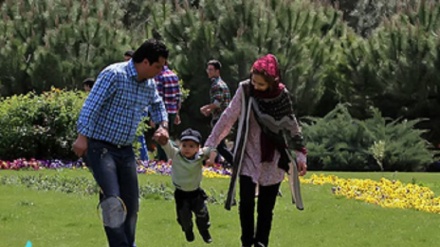Iranian Family (20)
In religious texts, a kind glance toward one's parents; and the kind glances of spouses to each other leads to further proximity with God Almighty.
In the religious and psychological domains, mankind has always been guided against any sinful glances and ogling. However, did you know that spiritually rewarding glances also exist. In religious texts, a kind glance toward one's parents; and the kind glances of spouses to each other leads to further proximity with God Almighty.
Now, let's open the windows, breathe fresh air, and smile toward one's family. Your kind glances reinforce your emotional relationship with the members of your family.
Today, we become familiar with the rights of Iranian families within the Constitution of the Islamic Republic of Iran.
The Islamic Republic of Iran's Constitution, in order to revive the status of women and families, has allocated a number of its tenets to them so that women's rights would never be violated and they would not be objectified, and to maintain women's role in Islamic Iran as active and responsible members of the community.
Given that based on the 2nd Tenet of the Constitution of Islamic Republic of Iran, the sacred Islamic system is based on the rule of God, and submission to God Almighty; family as the main pillar of social life is focused upon; and the Constitution of the sacred Islamic establishment has paid especial attention to families. In fact, within the introductory section of the Constitution, family has been named as the foundation of the community and the main hub for growth and elevation. Based on this interpretation of family; women are never objectified, and in fact maintain their significant and honorable task of motherhood for upbringing righteous and responsible children; while also fulfilling their important duties in different domains of life. Hence, in the Islamic outlook, women's status is uniquely valued, honored, and respected.
The 10th Tenet of the Constitution of Islamic Republic of Iran has obligated the government toward family and reinforcement of this fundamental unit of the community. This tenet points out: "Given that family is the fundamental unit of the Islamic community, all of the related rules and regulations, and plans should facilitate the establishment of family; safeguard its sacredness; and sustain familial relationships based on Islamic rights and ethics."
The rights of families are a set of rules and regulations, duties, and responsibilities which have been taken into consideration by the divine religion of Islam for the sustainability of families.
The goal of protection of sacredness of families is rooted in the divine religion of Islam, which has always called for reinforcement of the family.
Hence, based on the 21st Tenet of the Islamic Republic of Iran's Constitution, the government is duty-bound to establish a competent court to safeguard families. This principle has been taken into consideration because in the past families failed to attain their true and valuable status in the society as the result of imprudent and faulty non-Islamic policies which were adopted under the suppressive rule of Pahlavi despotic regime. Furthermore, the Islamic Republic of Iran's Constitution, in order to promote the establishment and maintenance of virtuous families, instructs the government to focus on two principles, which are namely establishment of family based on its Islamic rights; and growth and development of Islamic ethical virtues within families.
Based on the 20th Tenet of the Islamic Republic of Iran's Constitution, all of the members of the community, namely men and women, are equally supported by the law, and are granted all humane, political, economic, social and cultural rights based on Islamic rules and regulations. Based on the 21st Tenet of the Islamic Republic of Iran's Constitution, the government should grant women all of their rights based on Islamic rules, such as preparing the grounds for the growth of women's personality, and revival of women's material and spiritual rights. The government is also duty-bound to support mothers; especially throughout their pregnancy, in addition to orphans; a competent court should be established for protection of the family; and widows should also be covered by insurance.
Now, let's study the topic of spirituality in families. Iranian family is characterized by monotheism, amity, kindness, and spirituality, and spouses should cover this spiritual path, together. When two faithful individuals get married, and meet each other's physical and spiritual needs, they attain peace of mind; as the result of which they can achieve a superior spirituality. Currently, counselors and psychotherapists have become more sensitive toward spiritual and religious topics; considering religion and spirituality as two important sources of peaceful co-existence.
Faith in God, and spirituality are the necessities of married life, resulting in the reinforcement of emotional bonds among the family members. Faith in God cements the foundations of family via reinforcement of the individuals' ethical virtues, and granting meaning to life, in addition to formation of a sense of content among the members of the family. Meanwhile, whenever families face woes and hardships such as physical illnesses and ailments, their religious beliefs grant order, and once again give meaning to their lives. For many families, spirituality can be an important and extraordinary source of power and strength.
In accordance to medical studies, spirituality can leave a huge positive impact on the mental health of individuals.
MR/EA


